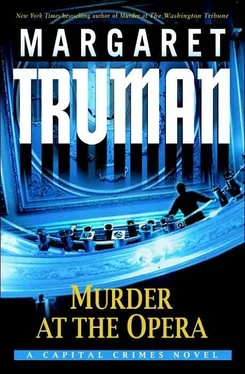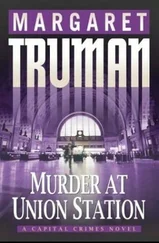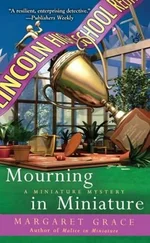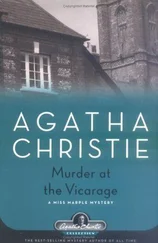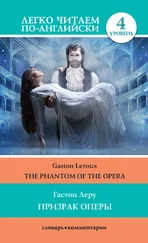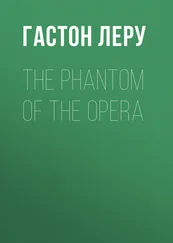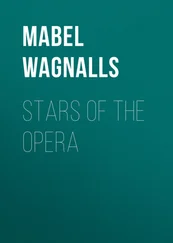“She decided not to cooperate?” Berry asked.
“That’s right. She got cold feet. I don’t think she ever intended to do it. She might have been a little screwed up, preaching how the U.S. is out to conquer the world, keep people in poverty, dumb stuff like that. But she wouldn’t have tried to assassinate anybody.” He shook his head. “Man, when she told me about the plan, I just laughed. At first. She was supposed to get close to the president whenever she could and-and kill him. Kill somebody. Charise told me that the president and his wife were opera lovers, and attended a lot of operas. Melincamp and the terrorists figured she’d have it easy getting close, being young and pretty and Canadian, maybe even get to sing for them, and then shoot him.”
“She had a gun?” Willie asked.
“Melincamp did. He showed it to me whenever he threatened me about talking to people.”
“When did Charise confide in you about the plot, Chris?” Sylvia asked.
“Just before she was killed. I told her we should go to the police or Secret Service or somebody, but she said she wanted to talk to Melincamp first. She was supposed to meet him at the Kennedy Center the night he killed her.”
“And Melincamp admitted to you that he’d murdered her?” Berry asked.
Warren nodded. “That’s when he said the same thing would happen to me if I talked about it. He tried to get me to take her place and kill the president, but I told him no way. If Melincamp didn’t pull it off, they wouldn’t pay him the money he was promised.”
Berry halted the session to see whether Warren wanted anything to eat or drink.
“No. I just want to get this over with.”
“Fair enough,” Berry said. “Now, what about last night? You went to see Melincamp’s partner, Ms. Baltsa.”
Another nod from Warren. He kept his head lowered, his eyes focused on the table as he spoke. “I went to the hotel to tell her I wanted out of the program at Takoma Park, and was going back home.”
“Did she know about this scheme of Melincamp’s to kill an American official?”
“No.”
“Did she know he’d killed Ms. Lee?”
“She suspected, but didn’t know for sure until I told her last night. She said Philip was coming to see her later, after I left. I didn’t kill her. I swear I didn’t.”
The detectives said nothing in response; they knew that he was telling the truth.

“You still have him in custody?” the FBI agent asked Cole Morris.
“Yes. He’s in protective custody.”
“We’ll want to talk to him.”
“Of course.”
“Did he give you the names of this Arab boyfriend back in Toronto, and his terrorist friends?”
“Yes.” Morris provided another piece of paper with that information.
“We’ll take it from here,” Browning said from his spot at the end of the long table. “This goes far beyond just the murder of some opera singer. There’s national security at stake.”
“Until we’re told otherwise,” the FBI agent said, “it’s our jurisdiction.”
“I’ll get a reading from Justice,” Browning said. “This young man aided and abetted a terrorist plot to kill the president of the United States. He can be held as an enemy combatant until all the links have been explored, all the dots connected.”
Berry looked at Morris and raised his eyebrows.
“We’re happy to help in any way we can,” Morris said, “but until I get a reading from Justice that says otherwise, Mr. Warren will stay with us. He’s a material witness to two murders that occurred in our jurisdiction.”
“Maybe this will help you with the murder of the opera singer at the Kennedy Center,” Browning said, sliding badly wrinkled and folded sheets of yellow legal-size lined paper to Morris.
“What’s this?” Morris asked.
“Read it,” Browning said. “It was found on Melincamp in New York.”
Morris carefully unfolded the pages and ran his hand over them on the table to straighten the creases. Most of the handwriting was crude and in blue pen, difficult to read. A few lines at the top of the first page had been written in pencil, obviously added after the main section.
To whom it may concern:
In the event of my death, I want you to understand why I did what I did.
The writing in blue pen followed.
She died quickly and with a modicum of suffering.
This came as no surprise. Unlike so-called crimes of passion which are invariably messy, drawn out, and painful, I’d been planning her death for more than a week.
She had to be eliminated because she’d learned something that I preferred she not know, which raised the possibility that she would pass that newfound knowledge along to others. I couldn’t allow that.
Had knowing the victim made it easier or more difficult for me? Of course, having known her cast me as a suspect, along with dozens of others. Murderers who are strangers to their victims invariably stand a better chance of getting away with it. There was a brief temptation to enlist the aid of another person, someone outside our circle of acquaintances, but I quickly ruled that out. The fewer people who know about a murder, the better.
That the murder took place onstage at the Kennedy Center Opera House would lead one to believe that I have a flair for the dramatic. But that was not the reason the area was chosen as the place to ensure her silence. I’d considered a number of settings-her apartment, on the street, or in a secluded room in the Opera company’s rehearsal space at Takoma Park. She provided the answer by insisting that we meet on the stage that night, actually in the early morning hours, long after everyone was gone for the evening except perhaps for a couple of Kennedy Center security guards, who wouldn’t come into the theater unless given reason to, which I certainly didn’t intend to provide.
It should also be pointed out that my choice of a weapon had nothing-absolutely nothing-to do with the fact that the encounter took place on the Opera House’s main stage, where the Washington National Opera would soon present the latest production of Puccini’s warhorse, Tosca. Moments before dealing the fatal blow, I thought of the justified murder of the cruel, lecherous Scarpia in Tosca’s Act II. The major difference was that this slaying was committed in shadows and without onlookers, while Tosca’s stabbing of the cruel chief of the secret police would take place before thousands bearing witness to her defensible action. Of course, Tosca’s dramatic killing of Scarpia is make-believe. This one was very real; I did not break into the aria “Vissi d’arte” before completing the act, as Madame Tosca has done thousands of nights on grand stages around the globe.
The victim was eventually found, of course, although it took almost a full day. I’d placed the body in such a location where few would have reason to go under ordinary circumstances. When her body was discovered, there was a flurry of media and law enforcement activity, and much was made of the fact that the homicide took place inside the revered Kennedy Center, and in that institution’s Opera House, where betrayal, passion, intrigue, and murder take place on a regular basis-but only during performances on the main stage. The press had a field day with opera analogies, the weapon used, the setting, and the connection of the deceased with the Washington National Opera.
In the meantime, Tosca, and the larger comic opera that is Washington, D.C., itself-but that too often turns deadly-must, and did, go on.
And so must I.
Sincerely,
Philip Melincamp
Morris handed the papers to Berry. “Thanks,” he said to Browning. “We know Melincamp killed the singer, but it’s nice to have this. Dramatic, wasn’t he?”
Читать дальше
